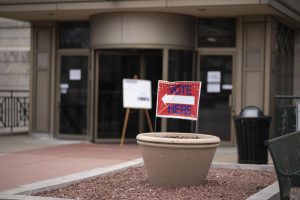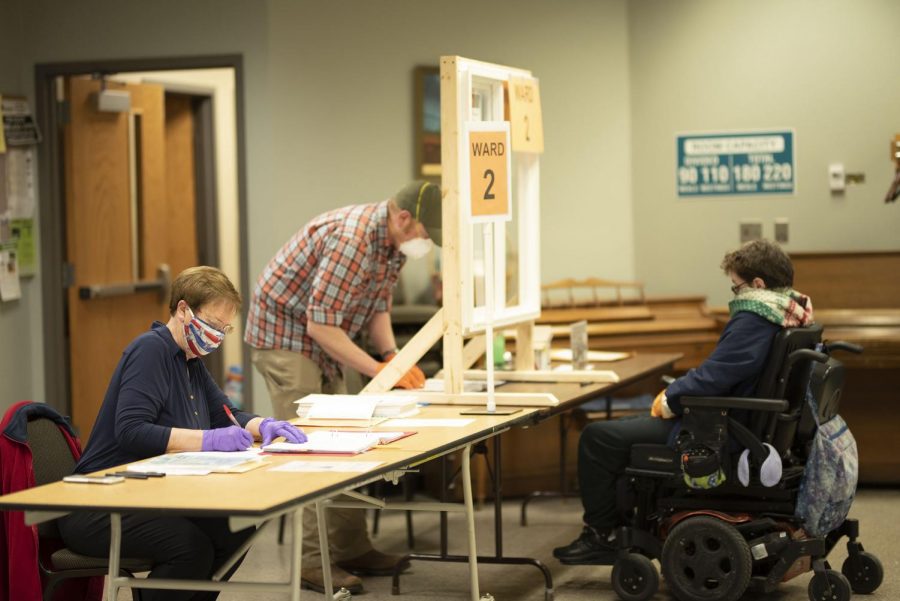State election on, off and on again after Supreme Court vote
April Lee / Advance-Titan — City of Oshkosh poll workers at the Oshkosh Seniors Center wore masks and took other preventative methods Tuesday to stop the spread of the coronavirus during the spring election.
April 6, 2020
On Monday, the Wisconsin Supreme Court voted 4-2 to block an executive order from Gov. Tony Evers that would have suspended in-person voting for Tuesday’s spring election.
The order would have moved in-person voting from April 7 to June 9 if the state Legislature could not pick a new election date in a special session that would have been held Tuesday.
Before issuing the order, Evers had previously said he did not have the power to move the election, and would need the Legislature to do so.
On April 3, Evers asked the Legislature to meet the next day in a special session to move the election, but the session was adjourned within seconds without discussion or debate.

The order said Evers had the power to move the election under state law, citing a statute that says a governor may issue orders “he or she deems necessary for the security of persons and property.”
Not moving the election will put voters and poll workers at risk of exposure to COVID-19 and risk infecting anyone they came in contact with after voting, the order said.
In a press release, Evers said the suspension of in-person voting was not an easy decision to make.
“But as municipalities are consolidating polling locations, and absent legislative or court action, I cannot in good conscience stand by and do nothing,” he said. “The bottom line is that I have an obligation to keep people safe, and that’s why I signed this executive order today.”
Shortly after the order was filed, Assembly Speaker Robin Voss, R-Rochester, wrote on Twitter that the order was a “flip-flop.”
“We don’t live in a banana republic where the executive can just cancel elections because he doesn’t want to hold them,” Voss tweeted.
Voss and Senate Majority Leader Scott Fitzgerald, R-Juneau, proceeded to challenge the order in Wisconsin’s Supreme Court, telling municipal clerks to continue with the election.
Four of the court’s conservative justices struck the order down, while its two liberal justices dissented. Justice Daniel Kelly, a conservative seeking re-election, did not participate.
More than 2,400 members of the Wisconsin National Guard have been mobilized to state active duty to serve as poll workers in Wisconsin’s election, according to a press release.
“Our entire team has answered the call and will be ready to serve our state during the election,” Maj. Gen. Paul Knapp said.
Democratic Milwaukee State Rep. David Bowen, who has contracted COVID-19 and recovered, said in a statement that holding the election will put lives at risk as confirmed cases and deaths continue to rise in Wisconsin.
“At this point, top public health officials are saying that we are entering a time when it is more important than ever to stay home and stay isolated, and to still expect thousands of Wisconsinites to gather in public to vote would not only be irresponsible, it would be deadly,” he said.
NextGen Wisconsin, a liberal organization that aims to increase turnout among young voters, also supported the postponing in-person voting.
“The bottom line is that an election held tomorrow would pose a hazard to the health of communities across Wisconsin,” NextGen Wisconsin State Operations Director Christina Carvalho said. “Any election that occurs at this moment will endanger lives and will lead to a faster spread of COVID-19.”














